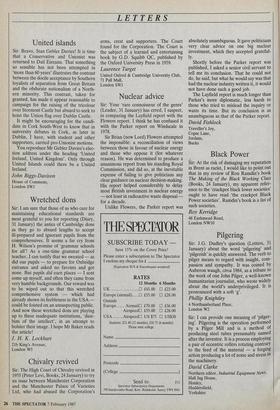Nuclear advice
Sir: Your 'rare connoisseur of the genre' (Leader, 31 January) has erred, I suspect, in comparing the Layfield report with the Flowers report. I think he has confused it with the Parker report on Windscale in 1978.
Sir Brian (now Lord) Flowers attempted the impossible: a reconciliation of views between those in favour of nuclear energy and those who oppose it (for whatever reason). He was determined to produce a unanimous report from his standing Royal Commission, and did so, at the inevitable expense of failing to give politicians any clear guidance on nuclear decision-making. His report helped considerably to delay most British investment in nuclear energy — not least in radioactive waste disposal for a decade.
Unlike Flowers, the Parker report was absolutely unambiguous. It gave politicians very clear advice on one big nuclear investment, which they accepted grateful- ly.
Shortly before the Parker report was published, I asked a senior civil servant to tell me its conclusion. That he could not do, he said, but what he would say was that had the nuclear industry written it, it would not have done such a good job.
The Layfield report is much longer than Parker's more diplomatic, less harsh to those who tried to mislead the inquiry or waste its time. But its conclusion is as unambiguous as that of the Parker report. David Fishlock Traveller's Joy, Copse Lane, Jordans, Bucks


















































 Previous page
Previous page